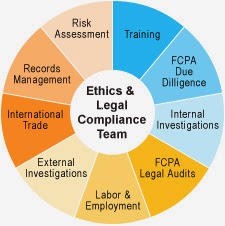Engineering professionalism and ethics
A great deal has been written about professionalism and engineering ethics. This material along with expanded examples and detailed discussions of engineers as expert witnesses appears in the book Advanced Reservoir Engineering and Management. Highly recommended reading includes “Good Ethics Makes Good Business Sense” and “Building a Best-in-Class Compliance Program.”
What is a Profession?
A profession is a career or occupation based on specialized education
and training, the purpose of which is to provide disinterested counsel
or service for a defined compensation independent of other business
gain. Examples of professions include accounting, surveying, medicine,
dentistry, actuarial science, law, architecture and engineering.
Professions share several characteristics including:
- Being a full-time occupation,
- Having a specialized course of study,
- Being governed by local and national associations,
- Having codes of professional conduct, and
- Having state licensing regulations.
The existence of state regulatory bodies governing the practice of a
profession and deciding who can be admitted into a profession limits
access to that profession and bestows a limited monopoly on the practice
of that profession. If the state requires a medical doctor to approve
prescriptions for certain medicines, the required training and testing
of medical doctors provides a kind of limited monopoly. Similarly,
requiring a licensed professional engineer to certify a certain type of
document restricts those who can practice certain aspects of the
profession.
Can you imagine a situation in which a company could employ medical
doctors or attorneys who were not educated and licensed to governmental
standards? They would be limited to only doing certain internal
activities that didn’t affect the public. We would assume that would be
unusual. But in the case of U.S. petroleum engineering it is, in fact,
the norm.
Most states do not require the licensing of engineers who are employees
of a company that do not offer to perform engineering services to the
public. Some people refer to licensed professional engineers as
“registered” engineers; the term licensed conveys the concept more
correctly.
Ethics
The Society of Petroleum Engineers
is the largest professional organization that represents engineers
including more reservoir engineers than any other organization.
Engineering ethics deals with the standards of professional conduct for
engineers with respect to the engineer’s responsibility to the public,
to his employer and clients and to the profession of engineering. The
SPE Guide for Professional Conduct summarizes these obligations.
Guide for Professional Conduct
Preamble
Engineers recognize that the practice of engineering has a vital
influence on the quality of life for all people. Engineers should
exhibit high standards of competency, honesty, integrity, and
impartiality; be fair and equitable; and accept a personal
responsibility for adherence to applicable laws, the protection of the
environment, and safeguarding the public welfare in their professional
actions and behavior. These principles govern professional conduct in
serving the interests of the public, clients, employers, colleagues, and
the profession.
The Fundamental Principle
The engineer as a professional is dedicated to improving
competence, service, fairness, and the exercise of well-founded judgment
in the ethical practice of engineering for all who use engineering
services with fundamental concern for protecting the environment and
safeguarding the health, safety and well-being of the public in the
pursuit of this practice.
Canons of Professional Conduct
- Engineers offer services in the areas of their competence and experience, affording full disclosure of their qualifications.
- Engineers consider the consequences of their work and societal issues pertinent to it and seek to extend public understanding of those relationships.
- Engineers are honest, truthful, ethical, and fair in presenting information and in making public statements, which reflect on professional matters and their professional role.
- Engineers engage in professional relationships without bias because of race, religion, gender, age, ethnic or national origin, attire, or disability.
- Engineers act in professional matters for each employer or client as faithful agents or trustees disclosing nothing of a proprietary or confidential nature concerning the business affairs or technical processes of any present or former client or employer without the necessary consent.
- Engineers disclose to affected parties any known or potential conflicts of interest or other circumstances, which might influence, or appear to influence, judgment or impair the fairness or quality of their performance.
- Engineers are responsible for enhancing their professional competence throughout their careers and for encouraging similar actions by their colleagues.
- Engineers accept responsibility for their actions; seek and acknowledge criticism of their work; offer honest and constructive criticism of the work of others; properly credit the contributions of others; and do not accept credit for work not their own.
- Engineers, perceiving a consequence of their professional duties to adversely affect the present or future public health and safety, shall formally advise their employers or clients, and, if warranted, consider further disclosure.
- Engineers seek to adopt technical and economical measures to minimize environmental impact.
- Engineers participate with other professionals in multi-discipline teams to create synergy and to add value to their work product.
- Engineers act in accordance with all applicable laws and the canons of ethics as applicable to the practice of engineering as stated in the laws and regulations governing the practice of engineering in their country, territory, or state, and lend support to others who strive to do likewise.



No comments:
Post a Comment